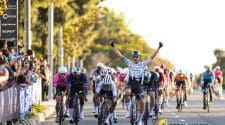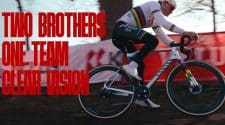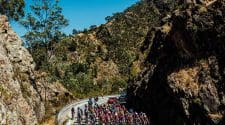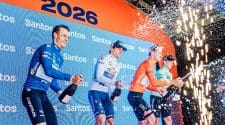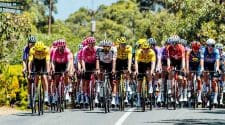Cycling is a physically grueling sport, but it’s the mental demands that often separate podium finishers from the pack. A 2021 article published by Bicycling noted that athletes who are mentally tough are more likely to train harder, push through plateaus, and ultimately experience superior performance outcomes. Yet the mental side of training, especially in the offseason, is often neglected. As we pointed out in our off-season training article, Training and racing also require a great amount of mental acuity, the offseason is a great time to lay the foundation for a successful season.â€
This is where cyclists can take a page from the playbooks of elite competitors in mind sports like chess, poker, bridge, and Go, games where victory hinges entirely on concentration, resilience, and mental stamina. These athletes engage in years of cognitive sharpening, developing techniques that help them think under pressure, recover from missteps, and constantly adapt. If your body is the engine, your mind is the onboard computer, and few know how to program theirs better than mind sport legends.
Here are four quotes from icons of poker, chess, bridge, and Go, along with the lessons cyclists can extract from their mental mastery:
“If the best player won every single time, no one would play.” — Chris Moneymaker, Poker Champion
Poker is a game where you learn to manage setbacks. Chris Moneymaker, the accountant who stunned the world by winning the 2003 World Series of Poker Main Event after qualifying online, didn’t just beat the odds; he rewrote them. In fact, the “Moneymaker effect” helped democratize poker by encouraging more people to play online poker, where huge tournaments, high player traffic, and exciting bonuses and rewards reign. Moneymaker’s rise catapulted poker into the mainstream, and his quote offers a vital mindset shift for cyclists: success is never guaranteed, and failure is part of the journey.
Cyclists, especially those coming off a tough season or dealing with injuries, can find themselves in a mental rut: comparing themselves to others, wondering if it’s worth continuing. But just like in poker, where even the best hands can lose to unexpected outcomes, bike racing is unpredictable. From crashes to mechanicals to weather conditions, not everything is under your control.
The key takeaway is this: don’t let fear of defeat define your approach. Moneymaker didn’t become a legend because he never lost; he became one because he dared to keep playing. Embrace unpredictability as part of the process, not a reason to quit.
“One bad move nullifies forty good ones.” — Bernhard Horwitz, Chess Master
Chess is often called a game of deep patience, but it’s also brutally unforgiving. Horwitz’s quote might seem pessimistic at first glance, but for cyclists, it underscores the need for precision and focus throughout a race or training cycle.
A cyclist might follow a structured training plan for months but then overtrain in the final weeks before a race, pushing past fatigue and risking burnout or injury. Horwitz’s quote is applicable to many cases, where a single misjudged decision can unravel years of progress. The same is true on the bike.
Cycling is a game of marginal gains: how you pace a climb, when you eat, how you recover. If mind sports teach us anything, it’s that mistakes often aren’t physical; they’re mental lapses at the worst possible time. Horwitz’s warning is a call to treat every decision, every recovery day, and every sprint finish with the importance it deserves.
“You’re seeing through new situations every ten minutes. Bridge is about weighing gain/loss ratios. You’re doing calculations all the time.” — Warren Buffett, Bridge Enthusiast
Billionaire investor Warren Buffett may be best known for the stock market, but he’s equally passionate about bridge. Bridge is a card game that demands real-time analytics, forecasting, and strategic pivots. His comment echoes a sentiment every cyclist knows deep down: your brain is constantly crunching numbers.
From power output and cadence to wind direction and drafting strategy, every ride is a moving puzzle. Just like a bridge player calculates risks on the fly, cyclists must make dynamic choices during training and racing. Should you attack this hill or wait for the descent? Should you bridge the gap or conserve energy?
What separates the good from the great isn’t just VO2 max; it’s decision-making. As highlighted in cycling motivation guides, sharpening mental agility is just as essential as physical fitness. Cyclists who learn to trust their strategic instincts under pressure ride smarter, not just harder.
“I still study Go every day. Losing miserably in a match is painful.” — Cho Chikun, 1,600+ Career Wins in Go
Cho Chikun is a Go champion and a living testament to lifelong learning. With over 1,600 wins in Japan (and beyond) to his name, the legendary player could easily retire on his accolades. Instead, he continues to study the game daily, acknowledging that defeat still stings. For cyclists, this attitude is pure gold.
Cycling can be punishing. No matter how well you prepare, there will be rides where your legs don’t respond, races where you get dropped early, and seasons where results don’t reflect your effort. Cho’s mindset “that the pain of losing is a motivator, not a deterrent” is one every rider should adopt.
As Sport Psychology Today outlines, resilience and perseverance are core to cycling. Cho reminds us that humility and hunger can coexist. You can be proud of your achievements and still hungry for the next evolution. Study your past races like Cho studies Go. Analyze. Adapt. Improve.
Final Thoughts: Turn Mental Training into Your Competitive Edge
Cyclists often talk about the importance of base miles, watts per kilo, and nutrition plans, but mental conditioning is the secret ingredient many overlook. As these quotes from mind sport champions show, success is as much about mindset as muscle. Whether it’s embracing variance like Moneymaker, protecting your consistency like Horwitz, making calculated decisions like Buffett, or committing to daily growth like Cho, the principles of mental endurance are universal.
This offseason, don’t just rebuild your legs. Rebuild your mental game and ride into the next season with sharper focus, smarter strategy, and stronger resolve.
Photo by Dó Castle: https://www.pexels.com/photo/man-sitting-beside-bicycle-2270328/







